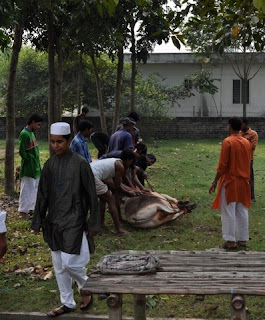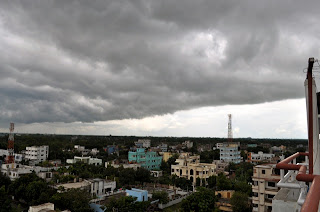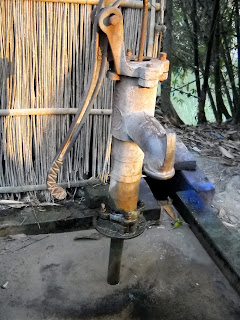
This picture captures the personality of the little girl in the poem below.
'The Bird Feather' was one of the first poems I read of Tagore's 30 years ago when I was studying Bengali. I loved the story but only got around to translating the poem a couple months ago.
Here is my rendition.
(Parents: You won't want to read this to your children and not because it is 'inappropriate.' Unfortunately, it hits the mark.)
The Bird Feather পাখির পালক
Time to play at last arrived
and midst the children, one broke free,
A little girl cried, “Mother, look!
See what I’ve found! Now look and see!
Her eyes were lit in joyful glee;
her lips in dancing laughter,
Hair was strewn and flowing free
a mane which followed after.
Wrists in colored bangles danced
Trembling bracelets jingling
Like little cymbals sang the news
Of what cupped hands were bringing.
Her arms wrapped ‘round her mother’s neck;
She sat upon her knee
The little girl cried, “Mother, look!
See what I have, O see!
A feather, washed in sunlit gold
and flowed with golden glory,
From forest canopy did fall
To tell the sunbeam’s story.
As eyes in gentle softness close
and sleep’s tale touch dream’s mystery,
So soft the clouds contained the touch,
Blue spoke of blue sky’s history.
A crowded nest of chirping young
Tweet in their feathered might
And chirp about the future morn
The hope of their first flight.
This feather brushed the maiden’s cheek
First one side then the other,
Wide-eyed and gaily spoke, “Look! See!
The maid said to her mother.
The mother looked indeed and saw,
Said, “Such a thing you found!”
Laughed and threw the feather outside
And left it on the ground.
The speechless child, dumbfounded, she
Wandered, sat upon a stump,
Bereft of treasured priceless feather,
Empty handed, shoulders slumped.
Playtime over, laughter ceased
No more tresses flying
Listless hands and downcast eyes
Teardrops told her crying.
Arose and searched, the feather found,
Hid it from her mother.
Alone, she’d keep it to herself
And never show another.




















































